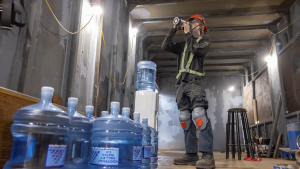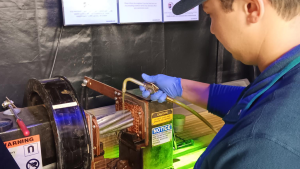The effectiveness of Bill C-45, which criminalizes occupational health and safety matters, came into law due to the 1992 Westray mine explosion. It is difficult to establish a criminal conviction, lawyer Landon Young said at the Partners in Prevention Health and Safety Conference and Trade Show.
The effectiveness of Bill C-45, which criminalizes occupational health and safety matters, and whether it has made a difference is asked quite often of lawyers, says one labour attorney.
“The one thing to keep in mind it is not easy for the Crown to establish a conviction under the Criminal Code, even under Bill C-45,” said Landon P. Young, a partner with Stringer Brisbin Humphrey.
“Perhaps, because of that, we have not had a successful prosecution in Ontario under Bill C-45.”
Young provided an update on Bill C-45 during the recent Partners in Prevention Health and Safety Conference and Trade Show.
Bill C-45 came into law on March 31, 2004, sparked by the 1992 Westray mining disaster in Nova Scotia in which 26 miners died in a coal mine explosion.
The owner and two senior mine officials were charged with criminal negligence causing death and manslaughter under the Criminal Code in the Westray case.
Widespread safety violations and a corporate culture of failing to take safety issues seriously were found to be direct causes of the disaster. Despite that, the prosecution of the company officials broke down and the charges were withdrawn.
An inquiry was held afterwards and it found an “appalling lack of resources” committed to the investigation to support those charges, Young explained.
Prior to Bill C-45, charges of criminal negligence could only be brought against the most senior executives of a corporation.
“That made it extremely difficult for the Crown to get convictions because the most senior executives do not sometimes have direct involvement in health and safety matters.”
Bill C-45 expanded the definition of a “person” to a corporation so now a company could become liable under the Criminal Code. The definition of “representative” was added, which applies to directors, partners, employees, members, agents and contractors of an organization.
“The net result is that it is now possible for an organization to be held liable if there is serious negligence,” said Young.
An individual can face life imprisonment for a conviction of criminal negligence under the Criminal Code if that negligence causes death. If the negligence causes bodily harm and not death, the individual could face sentences of up to 10 years. Corporations can face significant fines.
“Even though it is generally difficult for the Crown to establish a conviction under the Criminal Code it does not mean the employer can relax,” added Young.
Bill C-45 charges were recently brought against individuals and companies in connection with the 2009 Christmas Eve swing-stage collapse that claimed four lives and severely injured another worker in Toronto.
Metron Construction Corporation and three individuals related to the company were each charged with criminal negligence causing bodily harm and four counts of criminal negligence causing death.
The supplier of the swing-stage and an officer from that company are also charged.
The first criminal code “criminal negligence” charge after Bill C-45 was in Ontario in the case of Domenico Fantini, carrying on business as Vista Construction. In that incident, it was determined there was no trench support used in a trench collapse that killed a worker.
The accused pleaded guilty and a fine of $50,000 was levied. The Bill C-45 charge was dropped as part of a plea bargain.
The first conviction under Bill C-45 was for corporate charges of criminal negligence against Transpave in Quebec.
The corporation pleaded guilty to criminal negligence causing death and was fined $110,000 in September 2006.
Transpave manufactures concrete blocks for patios and a young worker was crushed to death when trying to clear a pile of stones on a production line.
A light rail curtain guarding system on a machine, which could have protected the worker, had been disconnected.










Recent Comments
comments for this post are closed